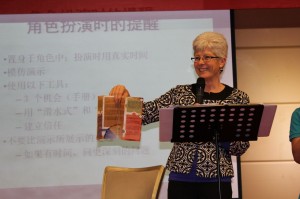- The elder board complains that the senior pastor seeks their input, then ignores their advice and does whatever he wants to do.
- A wife complains constantly about her husband; the husband rarely attends church anymore, and made excuses when the elders called him.
- A manager isn’t sure how to discipline a Christian employee who is giving a bad witness by flouting the company’s time-off policies.
- A college graduate wants to work full-time in Christian ministry, but his parents want him to get a good job and get married.
Sound like typical problems in your church or workplace, right? Except these all came from church leaders in East Asia. I had the opportunity to share biblical principles of peacemaking with two groups of dedicated Christians there earlier this month, and I was surprised by how similar their experiences are to ours in the U.S.
These pastors and church leaders, who came from various regions to attend this training, had already completed Resolving Everyday Conflict, a Peacemaker Ministries resource that has now been translated into their language. My colleague and I taught a three-day course on coaching a person to respond biblically to conflict, plus a half-day introduction to mediation. As you can see from the photo, the Peacemaker Ministries brochure has also been translated into their language.
Participants enthusiastically received this training. Unlike in the U.S., where there are too many conferences to choose from, opportunities for organized Christian gatherings are very limited in Asia, and tend to be theological lectures. In contrast, peacemaker training is experiential—tell it, show it, do it, discuss it. As in the U.S., participants were initially skeptical about roleplaying, but came to appreciate its value. One pastor commented, “When I was playing a party, my coach was treating me the way I coach people in my congregation—and I realized how unhelpful it was to give advice before I had truly listened to their heart.” Another pastor, roleplaying the coach, was actually jabbing her finger at her “party,” reminding her to “be salt and light,” and in the de-brief afterwards they both discussed how counter-productive that approach was.
Several pastors stood up at the end of the week to describe how this training had changed their lives. “I wasn’t going deep enough—my advice was too shallow. I was telling them what they ought to do, without regard for how it affected them.” “I didn’t know how to help them deal with their conflict, so I just told them I would pray for them; now I have tools to truly help them.” “I’ve been doing this wrong for years now; I missed opportunities to minister to people, but from now on, I’ll be different.”
Contrary to what I’ve learned about cross-cultural training, participants were quite willing to raise their hands and ask or answer questions, and to admit their mistakes. In the roleplays, they found it challenging to refrain from “fixing it” or “solving it” for the other person—the same challenge that U.S. audiences face. The trainees were younger than typical U.S. audiences, which bodes well for the church in East Asia: peacemaking will be integral to how they live out their faith.
The church in this particular country is not free, so I am refraining from providing details, or showing pictures of participants. But I can safely say that I am grateful for having been able to participate in this amazing experience, because now I’ve seen first-hand how God is bringing forth His kingdom in East Asia.
